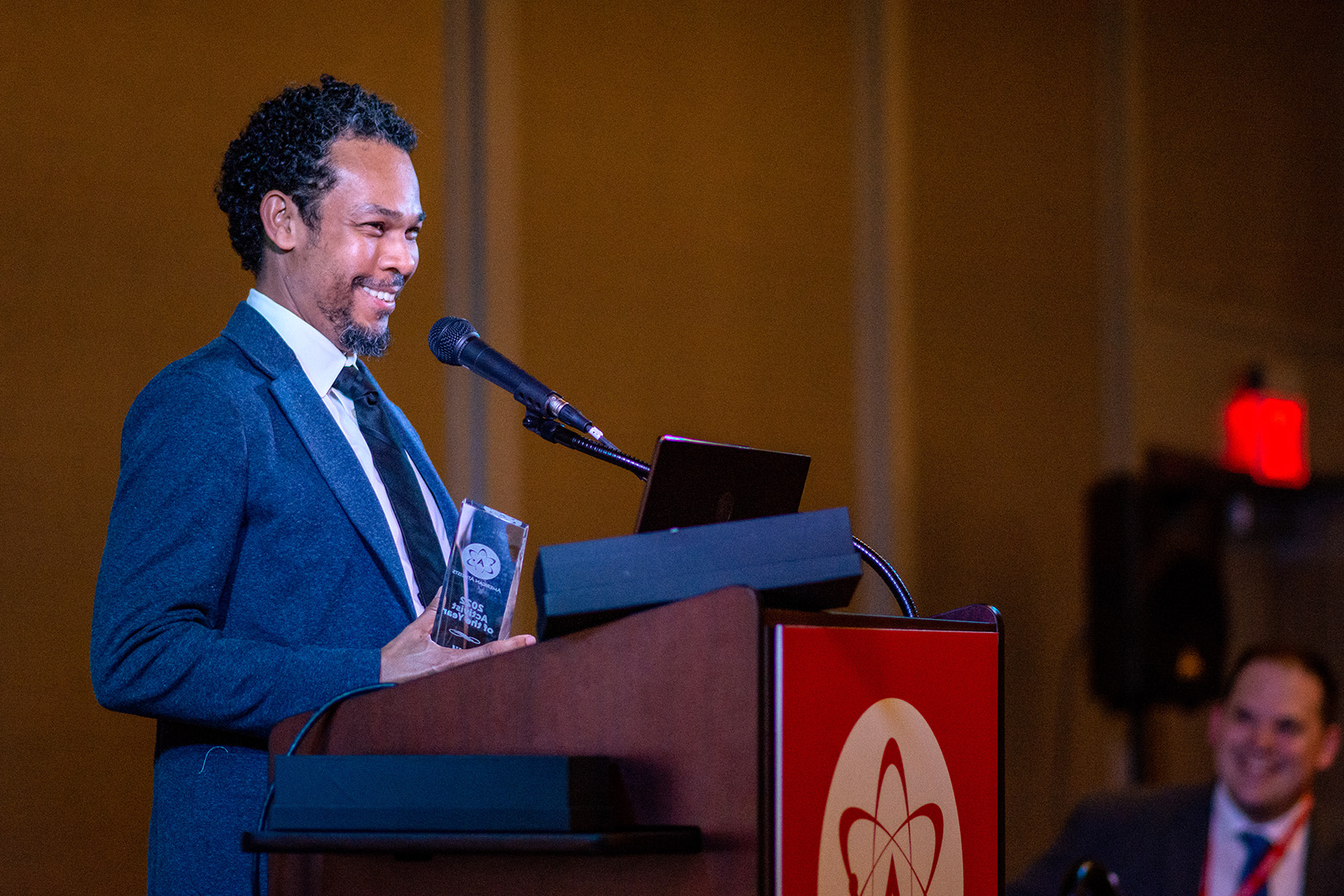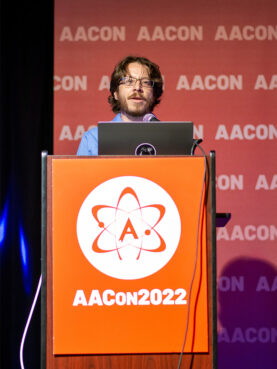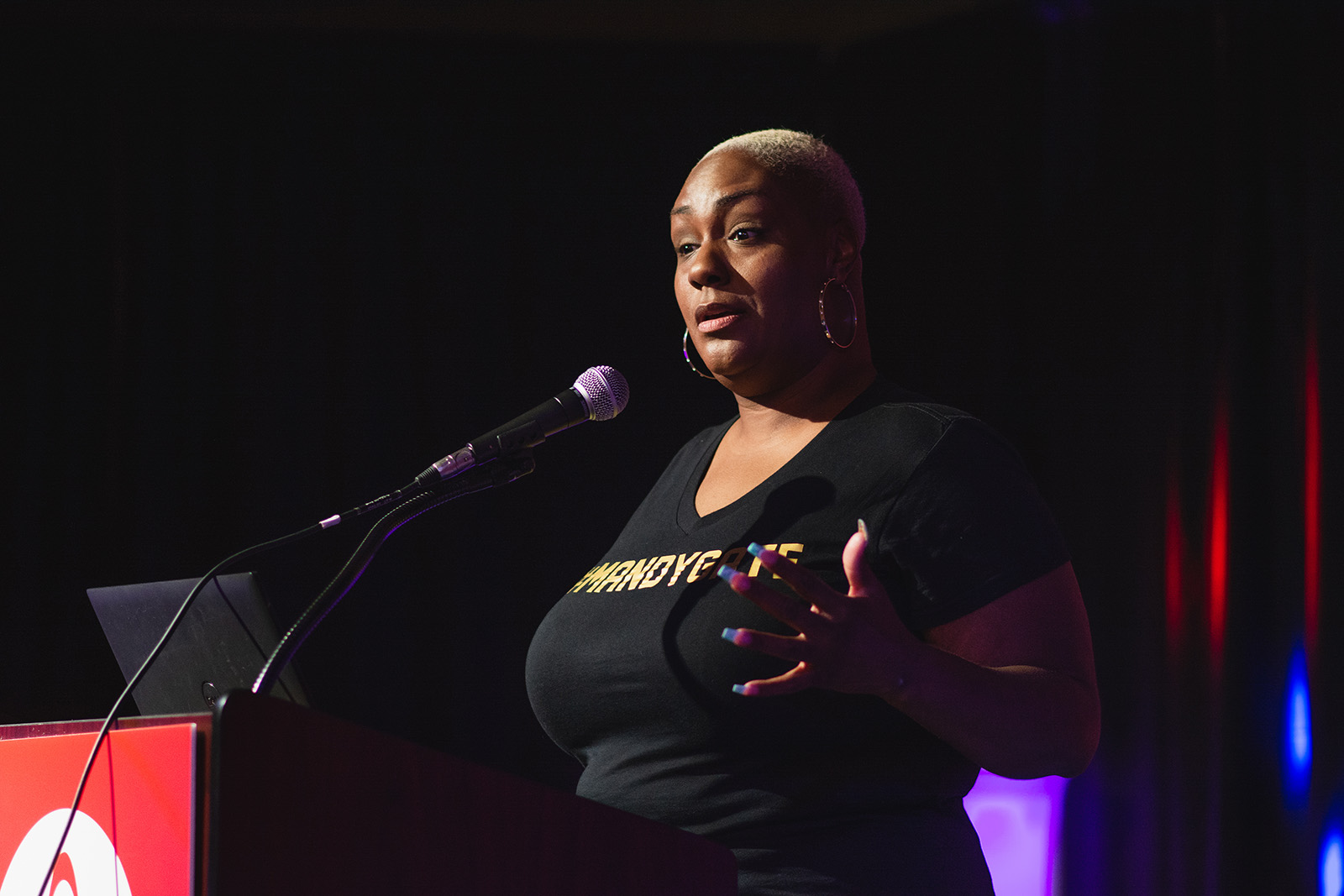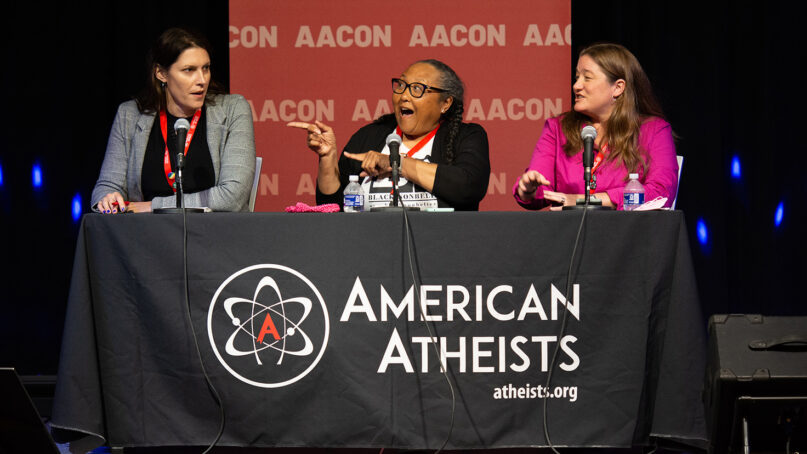ATLANTA (RNS) — As many gathered for Easter and Passover festivities over the weekend, an estimated 550 atheists, freethinkers, humanists and other nonbelievers converged on Atlanta for the American Atheists’ national convention. Typically held on Easter weekend, the annual event was live for the first time since the start of the pandemic, and the excitement was palpable.
Energized by the in-person gathering after such a long hiatus, the community of nonbelievers — a general term used for all those who identify with these groups — was ready to discuss some of the most pressing concerns facing their ranks today.
The convention kicked off on Thursday evening (April 14) with a lighthearted charity event in which all proceeds were donated to Access Reproductive Care-Southeast and ended Sunday afternoon with a community service event where attendees packed meals for those in need in metro Atlanta.
The service event was named “Two Hands Working,” after a phrase once uttered by American Atheists founder Madalyn Murray O’Hair. She said, “Two hands working can do more than a thousand clasped in prayer.” The 59-year-old civil liberties organization holds true to that mantra, according to communication director Tom Van Denburgh: “American Atheists has always placed action and activism at the center of our activities.”
At this year’s convention, the drive to action was particularly apparent, from the charity events to the workshops, lectures and panels.
“Today, America is at a critical moment in our history,” explained Van Denburgh. “White Christian nationalists are fomenting backlash against the de-Christianization of America, against greater racial diversity and against increasing acceptance of LGBTQ people.”
“They are legislating their religious extremism into the law,” he told Religion News Service. “Atheists must stand up and act.”
The conference included a wide range of panels, including issue-focused discussions on subjects such as abortion and reproductive justice, but also workshops on “taking your advocacy to the next level” and “practical tips for disrupting sexist behavior.” On Saturday, political advocate Brett Parker hosted a panel on “the nuts and bolts of making a difference in your state.”
Sam McGuire, the national field director for American Atheists, said the organization is working toward “building broad coalitions” and supporting local community groups of various sizes. Each state has different needs, she explained, adding that most active and well-organized groups tend to be in areas that are facing the most conflict. Tallahassee, Florida, for example, situated in deep red country, is home to one of the organization’s most active and well-established groups.
The issues facing nonbelievers are wide-ranging. Anything can be an atheist issue that involves equal rights, McGuire explained, especially when the “religious impose their beliefs on other people.”
Tina Marshall, lead organizer for the Charlotte, North Carolina, chapter of Black Nonbelievers, said one major issue for her group is voting rights. “We cannot be liberated until we are liberated from supremacy, superstition and belief,” she said, emphasizing that these are connected issues.
This past year, American Atheists has been involved in numerous legal actions around the country. Most recently, the organization has opposed South Carolina’s HB 4776 legislation, which seeks a “broad denial of medical care” based on religious conviction, explained Alison Gill, vice president for legal and policy at American Atheists.
American Atheists is supporting New York bill A8163A, which would require that nonreligion-based substance abuse treatment options be available for people required by a court to enter a program.

Wil Jeudy speaks during the American Atheists 2022 National Convention in Atlanta, April 16, 2022. Photo by Josiah Mannion
Wil Jeudy, the Texas state director for American Atheists, has been taking a different approach to community action. As a member of Houston Oasis, a secular community that meets weekly, Jeudy has been working to build community and safe spaces for nonbelievers to gather socially. “Houston is a blue island in a red sea,” Jeudy said, which makes this type of organization possible. Nonbelievers don’t have to worry about backlash within the area.
However, Jeudy has also been involved in advocacy and activism through other organizations. In fact, he was honored at the convention as the 2022 American Atheists Activist of the Year. One of Jeudy’s missions is to build advocacy coalitions across Texas and across organizational lines, including nonsecular groups such as Unitarian Universalist and Jewish organizations.
“In Texas, there’s an assumption that goodness comes from religion,” he said, so it helps for people to see atheists standing with members of faith-based organizations. “This creates a healthy cognitive dissonance,” he added, dispelling the idea that atheists are the bad guys.
As Jeudy suggested, another major concern expressed at the 2022 convention was combating pervasive myths about nonbelievers.

Aaron Rabinowitz speaks during the American Atheists’ national convention in Atlanta, April 16, 2022. Photo by Josiah Mannion
In the opening of his talk, Aaron Rabinowitz asked the audience, “Please raise your hand if you’ve previously heard some version of the ‘immoral nonbeliever stereotype.’ Please keep your hand up if someone has ever implied that you or someone you know is less moral because they’re a nonbeliever. OK, now keep your hand up if someone has ever overtly said to your face that you are less moral or ‘a bad person’ because you’re a nonbeliever.”
Rabinowitz, a podcaster and Ph.D. student at Rutgers University, went on to advocate for compassion and the building of community. “The strongest tool we have against this stereotype is something we’re already doing right here right now: coming together in a community centered around not just shared beliefs but shared values,” Rabinowitz said.
Similarly, Mandisa Thomas spoke about the struggle against bias and misconception. However, Thomas’ struggle is twofold. As the founder and President of Black Nonbelievers Inc., she not only has to combat the myth of the “immoral atheist,” but also the idea that “atheism is a white thing.”
There have always been Black atheists, she told the audience. This is a myth both within Black religious communities and the atheist movement itself. She said there is a “heavy stigma.”
Thomas expressed pride in both being a Black woman and an atheist. She offered ways in which the nonbeliever community can more adequately support and uplift the voices of Black atheists. “Spend your privilege,” she advised, among other tips. Her organization, based in Atlanta, will be holding its own national conference this fall in Chicago: “Woman of Color: Beyond Belief.”
Throughout the convention, attendees repeatedly expressed the need for action, suggesting a growing momentum in the movement. “There is a sense of urgency” due to the rising tide of Christian nationalism, Van Denburgh said.
“At our convention, we are getting disengaged atheists involved and helping active atheists get out there and further build community and coalitions,” he added.

Mandisa Thomas speaks during the American Atheists’ national convention in Atlanta, April 16, 2022. Photo by Josiah Mannion
Although hosted by American Atheists, the convention was attended by other nonbeliever groups from around the country, including the Freedom From Religion Foundation, Americans United, American Humanist Association, Foundation Beyond Belief and the Secular Student Alliance.
Despite expressed frustrations with the current political climate, there was an overall sense of hope within the community, buoyed by the growing number of young people identifying as nonbelievers. Since 2009, the number of Americans identifying as atheist has doubled, from 2% to 4%, and the number of agnostics rose from 3% to 5%, according to Pew Research. Gill believes the numbers are higher.
In 2020, American Atheists published its own findings about the community in its first comprehensive study on nonbelievers. It presented the data at the conference, showing that “nonreligious young people are the fastest growing segment of the nonreligious community.” This tracks with Pew findings that the average nonbeliever is 34 years old.
The young people bring hope, expressed both Gill and McGuire.
Next year’s American Atheist convention will be held on Easter weekend in Phoenix. Until then, the local communities will continue to gather in action and advocacy.
“We are ready,” Jeudy said. “As the world opens up again, we have plans.”





